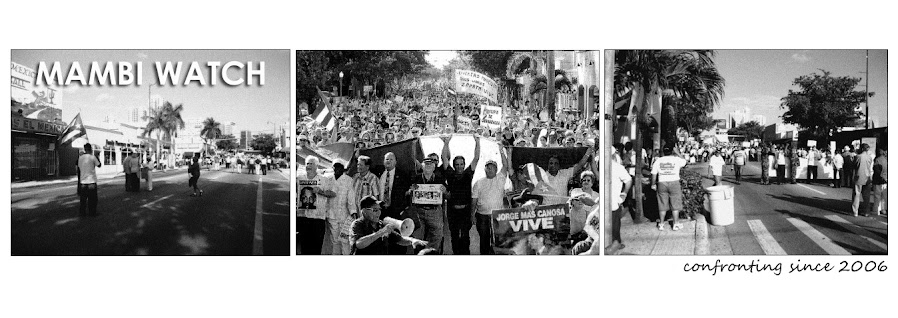 In news that has been censored by the Cuban government's official newspaper, Cuban political prisoner Oscar Elias Biscet has been awarded the Presidential Medal of Freedom. Biscet's son and daughter (Yan Valdez and Winnie) have received the award in his absence.
In news that has been censored by the Cuban government's official newspaper, Cuban political prisoner Oscar Elias Biscet has been awarded the Presidential Medal of Freedom. Biscet's son and daughter (Yan Valdez and Winnie) have received the award in his absence.This morning, in the East Room of the White House, President George W. Bush told the world:
"To the Cuban dictatorship, Dr. [Oscar Elias] Biscet is a 'dangerous man.' He is dangerous in the same way that Martin Luther King, Jr. and Gandhi were dangerous. He is a man of peace, a man of truth, and a man of faith. In captivity for most of the last eight years, he has continued to embody courage and dignity. His example is a rebuke to the tyrants and secret police of a regime whose day is passing."
The Presidential Medal of Freedom is given annually to "those who have made outstanding contributions to the security or national interest of the United States or to world peace, or those who have made a significant public or private accomplishment." But, it should be noted that under these requirements, Oscar Elias Biscet barely merits such a distinction. Biscet's prominence as a Cuban dissident is hardly an "outstanding" contribution to US interests or world peace. Yet, the category of "significant public or private accomplishment" is loosely defined enough to award the latest winner of American Idol.
This doesn't mean that Oscar Elias Biscet is not a noble or courageous man. He is without question. I urge people to review his website and "Declaration of Principles" which highlight his vision of a free Cuba. We should admire this man, as much as we should admire all Cuban dissidents who bravely stare directly into the face of a totalitarian regime. But let's be honest, today's recognition of Oscar Elias Biscet is nothing but political grandstanding for President Bush, and an extension of last month's speech on Cuba policy. Furthermore, the nomination of Biscet for the medal has been the result of years of lobbying from the hard-line exile political leadership.
Also note that today's recognition of Liberian President Ellen Johnson Sirleaf with the Medal of Freedom was another political move. President Johnson Sirleaf has not made any "outstanding contributions" to US interests or world peace. But, she certainly has made significant accomplishments in Liberia, a country that has suffered tremendous devastation in the past. The only thing that could be considered a contribution to world peace is the fact that President Johnson Sirleaf "has pledged to work towards reconciliation by bringing her former opponents into a government of national unity." This noble position is the hallmark of Oswaldo Paya's Varela Project and the "Todos Cubanos" Program for a national dialogue, but a component that Oscar Elias Biscet does not include in his "Declaration of Principles," which instead supports "[t]he dissolution of all political, propagandistic, and repressive organizations created by the communist regime since January, 1959."
It is also ironic that Biscet was compared to Martin Luther King Jr. because both were secretly monitored by their respective governments as "dangerous" men. It is uncontroversial (and upsetting) today to acknowledge that the US Federal Bureau of Investigations had been spying on Martin Luther King Jr. and his wife for years, even after the assassination of the civil rights leader, for the same reasons that Oscar Elias Biscet now suffers in a Cuban prison.
For more on Oscar Elias Biscet, and the other faces of those Cuba political prisoners who should be at the forefront of any discussion on Cuba and US/Cuba relations, please go to Marc Masferrer's blog, Uncommon Sense. I think its reasonable to say that the Uncommon Sense blog is perhaps THE BEST blog on the subject of Cuba's political prisoners. Way to go Marc, I don't see why you don't deserve a Medal of Freedom yourself.

No comments:
Post a Comment